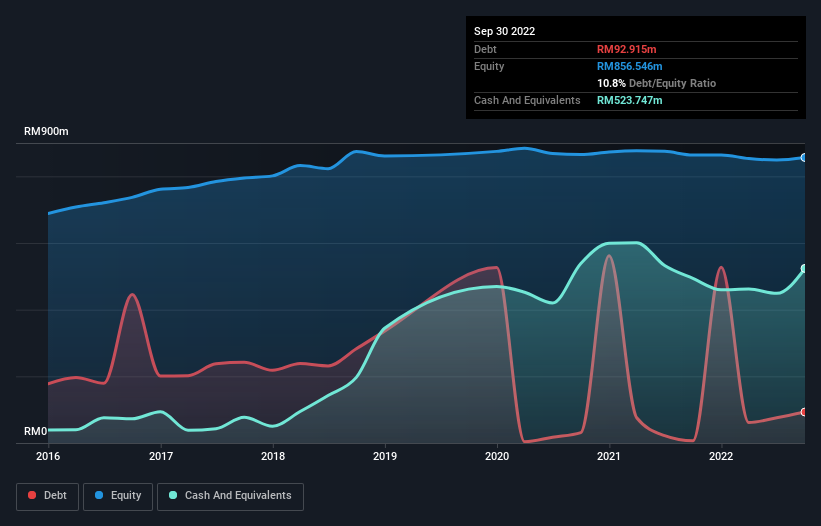Howard Marks put it nicely when he said that, rather than worrying about share price volatility, 'The possibility of permanent loss is the risk I worry about... and every practical investor I know worries about.' So it might be obvious that you need to consider debt, when you think about how risky any given stock is, because too much debt can sink a company. We can see that MCT Berhad (KLSE:MCT) does use debt in its business. But the real question is whether this debt is making the company risky.
When Is Debt A Problem?
Debt and other liabilities become risky for a business when it cannot easily fulfill those obligations, either with free cash flow or by raising capital at an attractive price. In the worst case scenario, a company can go bankrupt if it cannot pay its creditors. However, a more frequent (but still costly) occurrence is where a company must issue shares at bargain-basement prices, permanently diluting shareholders, just to shore up its balance sheet. Of course, debt can be an important tool in businesses, particularly capital heavy businesses. The first step when considering a company's debt levels is to consider its cash and debt together.
View our latest analysis for MCT Berhad
What Is MCT Berhad's Debt?
You can click the graphic below for the historical numbers, but it shows that as of September 2022 MCT Berhad had RM92.9m of debt, an increase on RM6.52m, over one year. But on the other hand it also has RM523.7m in cash, leading to a RM430.8m net cash position.

A Look At MCT Berhad's Liabilities
Zooming in on the latest balance sheet data, we can see that MCT Berhad had liabilities of RM940.1m due within 12 months and liabilities of RM46.9m due beyond that. Offsetting this, it had RM523.7m in cash and RM224.2m in receivables that were due within 12 months. So it has liabilities totalling RM239.0m more than its cash and near-term receivables, combined.
When you consider that this deficiency exceeds the company's RM196.7m market capitalization, you might well be inclined to review the balance sheet intently. In the scenario where the company had to clean up its balance sheet quickly, it seems likely shareholders would suffer extensive dilution. MCT Berhad boasts net cash, so it's fair to say it does not have a heavy debt load, even if it does have very significant liabilities, in total. The balance sheet is clearly the area to focus on when you are analysing debt. But you can't view debt in total isolation; since MCT Berhad will need earnings to service that debt. So if you're keen to discover more about its earnings, it might be worth checking out this graph of its long term earnings trend.
Over 12 months, MCT Berhad made a loss at the EBIT level, and saw its revenue drop to RM235m, which is a fall of 47%. That makes us nervous, to say the least.
So How Risky Is MCT Berhad?
We have no doubt that loss making companies are, in general, riskier than profitable ones. And we do note that MCT Berhad had an earnings before interest and tax (EBIT) loss, over the last year. And over the same period it saw negative free cash outflow of RM22m and booked a RM15m accounting loss. Given it only has net cash of RM430.8m, the company may need to raise more capital if it doesn't reach break-even soon. Summing up, we're a little skeptical of this one, as it seems fairly risky in the absence of free cashflow. There's no doubt that we learn most about debt from the balance sheet. However, not all investment risk resides within the balance sheet - far from it. To that end, you should learn about the 2 warning signs we've spotted with MCT Berhad (including 1 which is a bit unpleasant) .
Of course, if you're the type of investor who prefers buying stocks without the burden of debt, then don't hesitate to discover our exclusive list of net cash growth stocks, today.
New: Manage All Your Stock Portfolios in One Place
We've created the ultimate portfolio companion for stock investors, and it's free.
• Connect an unlimited number of Portfolios and see your total in one currency
• Be alerted to new Warning Signs or Risks via email or mobile
• Track the Fair Value of your stocks
Have feedback on this article? Concerned about the content? Get in touch with us directly. Alternatively, email editorial-team (at) simplywallst.com.
This article by Simply Wall St is general in nature. We provide commentary based on historical data and analyst forecasts only using an unbiased methodology and our articles are not intended to be financial advice. It does not constitute a recommendation to buy or sell any stock, and does not take account of your objectives, or your financial situation. We aim to bring you long-term focused analysis driven by fundamental data. Note that our analysis may not factor in the latest price-sensitive company announcements or qualitative material. Simply Wall St has no position in any stocks mentioned.
About KLSE:AVALAND
Avaland Berhad
An investment holding company, operates as a property development company in Malaysia.
Excellent balance sheet and good value.
Market Insights
Community Narratives


Recently Updated Narratives

TAV Havalimanlari Holding will fly high with 25.68% revenue growth


Fiducian: Compliance Clouds or Value Opportunity?


Q3 Outlook modestly optimistic
Popular Narratives


The company that turned a verb into a global necessity and basically runs the modern internet, digital ads, smartphones, maps, and AI.


MicroVision will explode future revenue by 380.37% with a vision towards success



